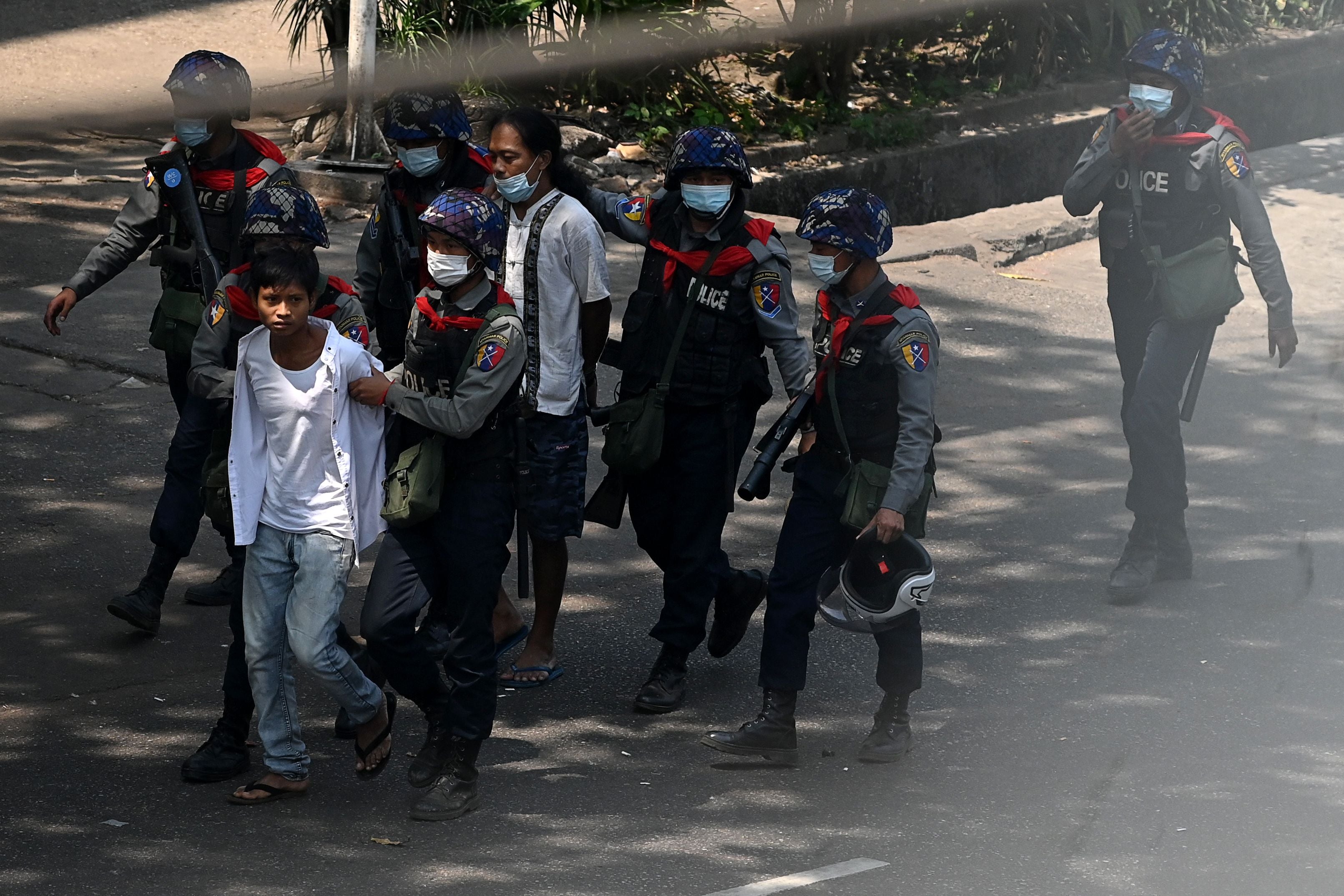Police ramp up clampdown on protesters in Myanmar
Protester reported to have been fatally shot

Your support helps us to tell the story
From reproductive rights to climate change to Big Tech, The Independent is on the ground when the story is developing. Whether it's investigating the financials of Elon Musk's pro-Trump PAC or producing our latest documentary, 'The A Word', which shines a light on the American women fighting for reproductive rights, we know how important it is to parse out the facts from the messaging.
At such a critical moment in US history, we need reporters on the ground. Your donation allows us to keep sending journalists to speak to both sides of the story.
The Independent is trusted by Americans across the entire political spectrum. And unlike many other quality news outlets, we choose not to lock Americans out of our reporting and analysis with paywalls. We believe quality journalism should be available to everyone, paid for by those who can afford it.
Your support makes all the difference.Police in Myanmar have launched their most sweeping crackdown in three weeks of nationwide protests against military rule, arresting hundreds of people and reportedly shooting dead one protester.
Myanmar has erupted into chaos since the military, known as the Tatmadaw, grabbed power earlier in February, arresting and detaining the southeast Asian country’s elected leader Aung San Suu Kyi alongside other party leaders.
Protesters opposed to the coup tried to descend on the streets to gather in Myanmar's two biggest cities and elsewhere, but security forces in some areas appeared to become more aggressive in using force and making arrests.
Photos shared on social media showed residents of at least two cities, Yangon and Monywa, resisted by erecting makeshift street barricades to try and block police advances.
Myanmar's crisis took a dramatic turn on the international stage at a special session of the United Nations General Assembly on Friday after the nation’s UN ambassador announced his loyalty to the ousted civilian government of Ms Suu Kyi and urged the world to pressure the military to cede power.
State television later announced that Kyaw Moe Tun has been fired, after he urged the United Nations to use "any means necessary" to reverse the military coup.
Arrests were made on Saturday in Yangon and Mandalay, where demonstrators have been hitting the streets daily to peacefully demand the restoration of the government of Ms Suu Kyi, whose National League for Democracy party won the election by a landslide back in November.
Police have been increasingly enforcing an order by the junta barring gatherings of five or more people.
Large protests against the coup have also erupted in many other cities and towns in the country.
Police in Dawei, in the southeast, and Monywa, 85 miles northwest of Mandalay, used force against protesters. Both cities, with populations of less than 200,000 each, have witnessed large demonstrations.
Social media carried unconfirmed reports of a protester shot dead in Monywa. The reports could not immediately be independently confirmed but appeared credible, with both photos and identification of the victim. The reports from Monywa also said dozens or more people were arrested.
The military takeover reversed years of slow progress toward democracy after five decades of military rule. Ms Suu Kyi's party would have been in power a second five-year term in office, but the army blocked parliament from convening and detained her and President Win Myint, as well as other senior government figures.
In an emotionally charged speech at the General Assembly in New York, Myanmar's UN ambassador told fellow delegates he represented Ms Suu Kyi's “civilian government elected by the people” and supported the fight against military rule.
He urged all countries to issue public statements strongly condemning the coup, and to refuse to recognise the military regime, as well as demanding more stringent international measures to stop security forces subjecting peaceful demonstrators to violence.
He drew loud applause from many diplomats in the 193-nation global body, as well as effusive praise from other Burmese on social media, who branded him as a hero. The ambassador flashed a three-finger salute that has been adopted by the civil disobedience movement at the end of his speech in which he addressed people back home in Burmese.
In Yangon on Saturday morning, police began arrests early at the Hledan Center intersection, which has become the gathering point for protesters who then fan out to other parts of the city. Police took similar action in residential neighbourhoods.
Security forces also tried to thwart protests in Mandalay, where roadblocks were set up at several key intersections and the regular venues for rallies were flooded with police.
Buddhist monks were prominent in Saturday's march in Mandalay, as they have been regularly, lending moral authority to the civil disobedience movement that is challenging the military rulers.
Mandalay has been the scene of several violent confrontations, and at least four of eight confirmed deaths linked to the protests, according to the independent Assistance Association of Political Prisoners. On Friday, at least three people there were injured, including two who were shot in the chest by rubber bullets and another who suffered what appeared to be a bullet wound to his leg.
According to the association, as of Friday, 771 people had been arrested, charged or sentenced at one point in relation to the coup, and 689 were being detained or sought for arrest.
The junta said it took power because last year's polls were marred by massive irregularities. The election commission before the military seized power coup had refuted the allegation of widespread fraud. The junta dismissed the old commission's members and appointed new ones, who on Friday annulled the election results.
Additional reporting by Associated Press



Join our commenting forum
Join thought-provoking conversations, follow other Independent readers and see their replies
Comments